
|

|

|

|
|
Reading
Classical Political Economic theorem... |
Collated by Maireid Sullivan
2012
|
For those wishing to understand the principles of Classical Political Economics, AKA: Ricardo's Law | The Law of Rent | Economic Rent | Land (Site) Value Taxation | Resource Rent, etc., the work of Henry George (1839–1897) is essential reading.
Download "Progress and Poverty" (1879)
See dedicated page: Remembering Henry George HERE
The Vatican, mistakenly, did not appreciate The Law of Rent theorem.
In 1891, Pope Leo XIII 'reined-in' the growing number of American priests and laity supporting Henry George's solutions to poverty by issuing an encyclical:
Rerum Novarum – "of revolutionary change" or "Rights and Duties of Capital and Labor"
Economics Professor Mason Gaffney's 1997 lecture (pdf), updated in 2000, provides a thoroughly referenced examination, and is a 'must read' for those wishing to understand the central role of the Vatican in shaping economic history. – PDF: Henry George, Dr. Edward McGlynn, and Pope Leo XIII
From the archives:
If Russia had Chosen Henry George instead of Karl Marx, Chapter XII,
"From My Hospital Window" by James Green, (1933), shared HERE |
Recommended reading short-list:
Books on the history, philosophy, and politics of economic thought:
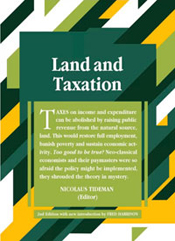
2nd Edition 2023
Land and Taxation, 1994
by Nicolaus Tideman PhD (Author),
Fred Harrison (Foreword),
Mason Gaffney PhD (Contributor)
published by Shepheard-Walwyn
|
Cover note:
"TAXES on income and expenditure can be abolished by raising public revenue from the natural source, land. This would restore economic activity. Too good to be true? Neo-classical economists and their paymasters were so afraid the policy might be implemented, they shrouded the theory in mystery." - Nicolaus Tideman (Editor)
Review
“There is a sense in which all taxes are antagonistic to free enterprise – yet we need taxes … so the question is which are the least bad taxes? In my opinion, the least bad tax [note switch to singular] is the property tax on the unimproved value of land, the Henry George argument of many, many years ago.”
- American economist and statistician, 1976 Nobel Memorial Prize in Economic Sciences, Milton Friedman (1912-2006).
Plus:
The Economics of Efficient Taxes on Land, January 1995, Nicolaus Tideman, Lincoln Institute of Land Policy (PDF)
Abstract
Land can be taxed in a number of different ways. This review is concerned with taxes on land that have little or no detrimental effect on economic incentives. Therefore, it concentrates on taxes on land according to estimates of sale value or rental value. The author examines the classical views of taxes on land of such writers as Francois Quesnay, Adam Smith, David Ricardo, James Mill, John McCulloch, John Stuard Mill, and Henry George. The two issues that provoked the greatest disagreement among them were whether it was possible to separate the value of land from the value of improvements for tax purposes, and whether and to what extent a tax on land could be fair. The paper also deals with income effects on taxes on land, the adequacy of land as a tax base for financing local public services, and the ethics of taxing land. |

Published by Land Research Trust
8 March 2022
Fred Harrison @geophilos
https://twitter.com/geophilos
“The US Constitution is designed for rent seekers.”
– Fred Harrison, 2022
|
#We Are Rent
Book 2
Rent seeking: the Crime against Humanity
By Fred Harrison
Western civilisation is threatened by the cannibalistic phase of what economists call free riding (or rent seeking), and which the author characterises as the culture of cheating. This culture was the source of the social pathologies that caused the collapse of the civilisations of antiquity, and the Fall of Rome. Fred Harrison explains that the global house price peak in 2026 will provoke the Great Convergence of four existential crises - social, economic, climatic and demographic. That convergence will overwhelm governments and result in the collapse of western civilisation, and may even threaten the viability of humanity itself. But there is just enough time to mobilise people's understanding of the driving force behind this cataclysm, and to institute the financial reforms that would rebuild social resilience. The democracies, however, will have to overcome the continuing threat from Donald Trump - the arch rent seeker - and the policy paralysis that afflicts governance today. The Westminster model is interrogated to reveal how the aristocracy of old, who grabbed the commons and turned the peasants into hostages, produced a political system that is not fit to meet the needs of the 21st century. The author deconstructs the history of the Mother of Parliaments to lay bare the character of the power that inflicts poverty and premature death on millions of people in the rich nations. That politics, he claims, is guilty of the greatest crime against humanity. |
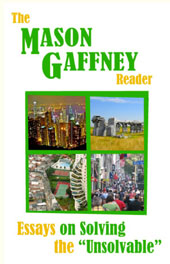
"Mason Gaffney
is a national treasure."
|
The Mason Gaffney Reader
On Solving the "Unsolvable"
Such dismal dilemmas economists pose for us these days! We're told that to attract business we must lower taxes, shut the libraries and starve the schools; to prevent inflation we must have millions of people unemployed; to make jobs we must chew up land and pollute the world; to motivate workers we must have unequal wealth; to raise productivity we must fire people. Mason Gaffney has devoted his career to demonstrating the viability of reconciliation and synthesis in economic policy. In these 21 wide-ranging essays, he shows how we can find "win-win-win" solutions to many of society's seemingly "unsolvable" problems. >>> more
Click HERE for reviews of his life work, along with his 2007 essay,
"Going My Way? Winding Through the Stumbling Blocks Between Georgism and Catholicism" |
Back to top
Synopsis of Ch. 8: Ireland: serfs not citizens HERE
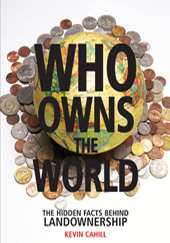
|
"The purpose of all the feudal land laws, derived from the fundamental principle of the feudal system was to prevent the population owning land. ... landownership in too few hands is probably the single greatest cause of poverty." – Kevin Cahill
And of economic collapse.
And of class.
And of oppression.
Who Owns the World -
The Hidden Facts Behind Landownership, 2006, Penguin Books
By Kevin Cahill
Who Owns the World is the first ever compilation of landowners and landownership structures in every single one of the world's 197 states and 66 territories. It covers the history of landownership as far as written history will allow and shows the division of landownership in every region of the globe.
Packed with revelatory information, the book:
* identifies the person who owns the largest proportion of the world's land and documents that person's landholdings;
* provides details of the next 25 top landowners;
* reveals that aristocratic families own over 60 per cent of Europe's land mass and receive most of the EC's agricultural subsidy allowance;
* documents the vast landholdings of the four largest religious groups: the Catholic Church and the other Christian churches, the Islamic trusts, and the temple possessions of the Hindus and Buddhists;
* details the landownership structure of all the countries of the British Commonwealth;
* contains a complete survey of the historic record of landownership, starting in Mesopotamia/Iraq in 8000 BC;
* lists many of the world's great Domesdays, going back to the earliest, in Ptolemaic Egypt;
* includes an analysis of the legal structures that have reduced 85 per cent of the earth's population to serfdom.
This is a breathtaking tome of huge political, economic and social importance. It will revolutionise our understanding of our planet, its history and its land.
Author's website HERE
Synopsis of Ch. 8: Ireland: serfs not citizens HERE |
Back to top
See
excerpts HERE
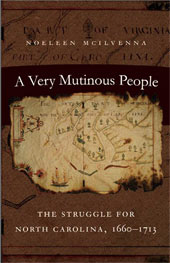 |
A Very Mutinous People
The Struggle for North Carolina, 1660-1713,
Noeleen McIlvenna, (2009).
University of North Carolina Press
"These ideas, cherished by George Durant, John Culpeper, and all those very mutinous people, eventually became accepted as the quintessential American values." – Noeleen McIlvenna, Ph.D.
Historians have often glorified eighteenth-century Virginia planters' philosophical debates about the meaning of American liberty. But according to Noeleen McIlvenna, the true exemplars of egalitarian political values had fled Virginia's plantation society late in the seventeenth century to create the first successful European colony in the Albemarle, in present-day North Carolina.
They created a new community on the banks of Albemarle Sound, maintaining peace with neighboring Native Americans, upholding the egalitarian values of the English Revolution, and ignoring the laws of the mother country.
"An understanding of the English Revolution is crucial to understanding the formative years of the North Carolina colony, for the politics of the people from top to bottom had been formed in the crucible of "Oliver's Days." The mixture of politics, religion, economics, and military experience suffused the thinking of all who had come of age in the twenty years prior to 1660. The future colonists of North Carolina had been exposed to all these ideas....
"... At first glance, the ideas of the English Revolution appear to have evaporated from the North Carolina terrain in the eighteenth century. The colony joined America's "Gulag Archipelago" as South Carolinians spread the slave society north, just as they would later expand it south into Georgia."
See
excerpts HERE
|
Back to top
See full reviews HERE
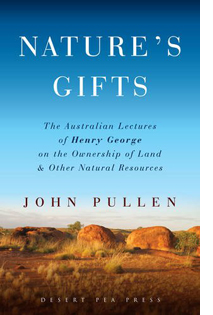
|
Nature's Gifts
The Australian Lectures of Henry George on the Ownership of Land and Other Natural Resources
By John Pullen
The Federation Press (2014)
In 1890, the famous American economist and social reformer, Henry George, arrived in Australia to begin a controversial 98-day public lecture tour. Following the international publicity generated by his book Progress and Poverty, with its challenges to conventional economics, he had made several lecture tours in Britain, attracting immense audiences. In Australia he visited 34 cities and towns and continued to promulgate vigorously and eloquently his radical program for the ownership, management and taxation of natural resources such as land, coal, and minerals.
Nature’s Gifts provides, for the first time, a detailed account of this important and progressive lecture series. Equal rights to land; land taxation; land prices; land rents; land nationalisation; and free trade and protection remain issues which are highly relevant today.
Engaging and insightful, this is a timely and critical study of the reforms proposed by Henry George and the possibility of establishing an efficient and equitable system for the ownership of natural resources.
Reviews
1. By John Holmes
Excerpt from geography professorJohn Holmes(2015) review: the first critical study of reforms proposed by Henry George: "Equal rights to land; land taxation; land prices; land rents; land nationalisation; and free trade and protection."
Pullen's day-to-day chronicle and thoughtful appraisal of Henry George's fourteen-week Australian tour in 1890 provides much-needed further insight into a formative period in Australian political history. ...
Pullen observes that this tour was actively supported by nonconformist ministers but hardly ever by Anglican or Catholic clergy.
–John Holmes, Australian Journal of Politics and History: Vol 61/3, 2015, pp. 450-483
2. By Rick DiMare
"My opinion is that John Pullen’s book is the most authoritative analysis of Henry George’s intentions to date." >>> more
See complete reviews HERE.
|
Back to top
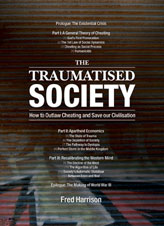
"strikingly impressive, and demands that the author be taken very seriously."
Bernadette Meaden |
THE TRAUMATISED SOCIETY
How to Outlaw Cheating and Save our Civilisation
by Fred Harrison
Shepheard-Walwyn UK (2012)
"This thesis is not only a restatement of the social price of inequality (such as Joseph Stiglitz The Price of Inequality, or Richard Wilkinson The Spirit Level). There is something deeper: humanity has lost touch with its spiritual roots, and with the ‘covenant’ which ancient wisdom saw in the triangle of relationships between humanity, the earth and God."
– Bishop David Atkinson, CHURCH TIMES
"... Harrison provides a sophisticated and engaging new theory of social trauma developing the idea that when whole societies or nations are dislocated from their land, traditional roots and cultural reference points, whole populations are then at the mercy of what he refers to as "the predator class". This predator class of social parasites then seeks to legalise a form of institutionalised "cheating" whereby whole peoples are robbed of their birthright to the social "commons" (the commons being one’s right to enjoy the full benefits of nature’s resources through a socialisation of rent on land values).
"This ’rent’ should serve as a public community resource to encourage genuine wealth creation and authentic culture. Thus land should never be owned or monopolised by private individuals to the exclusion of social need. The concept of the resulting social trauma that happens when land is divorced from social justice serves then as a basis to construct a form of political and economic activism that creates a kind of collective psychosocial therapy. But the predator class or "rent seekers" will need new markets to exploit through further land grabbing and taxation and because of this expansionism will sow the seeds of future global warfare."
– Wayne Sturgeon, Fourth World Review |
Back to top
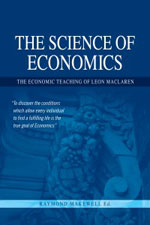
"Injustice is the inevitable result and poverty its inseparable companion."
Raymond Makewell
|
THE SCIENCE OF ECONOMICS:
The Economic Teaching of Leon MacLaren
By Raymond Makewell
Shepheard-Walwyn UK (2013)
Leon MacLaren (1910–1994) was a barrister, politician, philosopher and the founder of the School of Economic Science. He considered the true goal of Economics to be the discovery of the conditions which allow every individual to find a fulfilling life. In his view, science was a study of laws that exist in nature, whilst economics was a study of the humanities, with the interaction of human nature and the natural universe at its heart. MacLaren defined economics as ‘the study of the natural laws which govern the relationships between people in society’.
This book is based on a three-year course prepared by MacLaren for the School of Economic Science in London in the late 1960s. The editor, Raymond Makewell, presents the original subject matter revised with more recent examples and statistics from Australia, Canada, New Zealand, UK and USA.
Instead of making supply and demand the starting point, it begins with the simple observation that all material wealth is ultimately derived from land, and, where goods are exchanged the first requirement is trust, or a system of credit. From this starting point the major characteristics of the modern economy such as banking, companies or corporations, international trade, taxation and trade cycles are examined in terms of the conditions that govern how and why they evolved and how they operate today.
The framework in which the economy operates is examined in terms of how the system of land tenure and the concepts of property evolved in the English-speaking world, the role of government in economic affairs, and the degree of economic freedom. This reveals how the current economic situation denies people access to all that they need to work and produce wealth for themselves. |
Back to top
See excerpt HERE
Prologue by Fred Harrison:
Who's Afraid of Henry George (pdf)
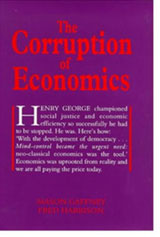
|
THE CORRUPTION OF ECONOMICS
By Mason Gaffney and Fred Harrison
Shepheard-Walwyn UK (1994)
Persistent economic failure explained.
"The contributors are critical of the role of land in neoclassical economics and . . . are in tune with the increasing realisation by economists of the importance of the property market to the macro economy."
– British Review of Economic Issues
Mason Gaffney is professor emeritus of economics at the University of California and the author of several papers, books, and submissions, including Coordinating Tax Incentives and Public Policy.
Fred Harrison is executive director of the Land Research Trust in London and the author of Boom Bust: House Prices, Banking and the Depression of 2010 and Wheels of Fortune: Self-Funding Infrastructure and the Free Market Case for a Land Tax.
... how the integrity of economics as a discipline was deliberately compromised in the United States towards the end of the 19th century. Several chairs of economics were funded at leading universities to rebrand economics to justify unearned income. The tools for this strategy became neo-classical economics, and, unlike classical economists like Adam Smith who described wealth as the product of three factors—land, labor, and capital—the new theorists reduced these to two: labor and capital, thus treating land as capital. This concealed the benefits enjoyed by those in receipt of the rent from land. The effect, the authors reveal, was to deprive professional economists of the ability to diagnose problems, forecast important trends, and prescribe solutions. |
Back to top
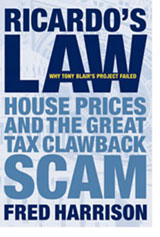 |
RICARDO'S LAW
by Fred Harrison
Shepheard-Walwyn UK (2006)
... without a knowledge of [the law of rent], it is impossible to understand the effect of the progress of wealth on profits and wages, or to trace satisfactorily the influence of taxation on different classes of the community.
– David Ricardo (1772-1823)
The argument for land value taxation is gaining ground among academics (although not politicians) and the book is a tour de force of the whole debate. For that it deserves careful study and Harrison deserves great credit. – Dan Lewis, PLANNING IN LONDON
This is the fundamental reason ... why the welfare state of the past 60 years has not worked. – Ashley Seager, in THE GUARDIAN
If the government were to carry out its revenue-raising function intelligently and fairly by replacing revenue from more damaging taxes with revenue from land value taxation, the changed price structure would enable the market economy to operate more freely and efficiently. That would go far to eliminate some of the problems that conventional economists now call market failure.
– James Robertson, in WORKING FOR A SANE ALTERNATIVE
The effect of charging a levy on the annual value of land would be much more than most economists will acknowledge ... [benefiting] those struggling to enter the housing market ... Don’t take my word for it. Read the book and become a knowledgeable advocate to help bring it about.
– Dr Francis Smith, in ROOF |
Back to top
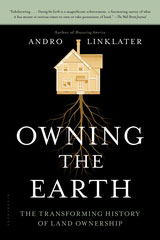
Obituary
Andro Linklater (1944-2013) chronicled the enormous impact on civilisation of private property.
By George Gibson
The Guardian
Friday 22 November 2013
|
Owning the Earth: The Transforming History of Land Ownership (2013), Bloomsbury USA
By Andro Linklater (1944-2013) Scotland
From the author of the acclaimed Measuring America, a dazzling chronicle, through history and across cultures, about how the ability to own the land we inhabit has shaped modern society.
Barely two centuries ago, most of the world's productive land still belonged either communally to traditional societies or to the higher powers of monarch or church. But that pattern, and the ways of life that went with it, were consigned to history by, Andro Linklater persuasively argues, the most creative and at the same time destructive cultural force in the modern era-the idea of individual, exclusive ownership of land.
Spreading from both shores of the north Atlantic, it laid waste to traditional communal civilizations, displacing entire peoples from their homelands, but at the same time brought into being a unique concept of individual freedom and a distinct form of representative government and democratic institutions. By contrast, as Linklater demonstrates, other great civilizations, in Russia, China, and the Islamic world, evolved very different structures of land ownership and thus very different forms of government and social responsibility.
The history and evolution of landownership is a fascinating chronicle in the history of civilization, offering unexpected insights about how various forms of democracy and capitalism developed, as well as a revealing analysis of a future where the Earth must sustain nine billion lives. Seen through the eyes of remarkable individuals-Chinese emperors; German peasants; the seventeenth century English surveyor William Petty, who first saw the connection between private property and free-market capitalism; the American radical Wolf Ladejinsky, whose land redistribution in Japan, Taiwan, and South Korea after WWII made possible the emergence of Asian tiger economies-Owning the Earth presents a radically new view of mankind's place on the planet.
Review
by Sean O'Grady, The Independent, 5 Feb. 2014
Excerpt:
Henry VIII's all-new Church of England in 1531 required its clergy to read to their congregations a special prayer inveighing against what Ed Miliband nowadays calls "rip-off landlords": "The earth, O Lord is thine and all that is contained therein; we heartily pray thee to send thy Holy Spirit into the hearts of them that possess the grounds, pastures, and dwelling places of the earth that they, remembering themselves to be Thy tenants, may not rack and stretch out the rents of their houses and lands… after the manner of covetous worldlings…"
… Henry himself had just engineered for himself one of the greatest transfers of wealth in history, through the dissolution of the monasteries and their assets, mostly appropriated to him, his navy and his cronies.
What do we fight wars for? "Territory", of course. So land matters, in a sort of primeval, mystical way, and it deserves a weighty "cross-sectional" history, roaming across all of its complex philosophical, scientific, legal, political and economic facets.
Land is not the same as property, still less capital, because, as Linklater himself stresses with a fine quote from Winston Churchill in 1906, "Land is a necessary of all human existence, which is the original source of all wealth, which is strictly limited in extent, fixed in its geographical position." >>>more
|
Back to top
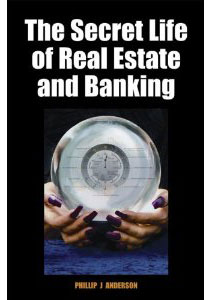 |
The Secret Life of Real Estate and Banking
by Phillip J. Anderson
Shepheard-Walwyn UK (2009)
Both exciting and timely. It provides detailed insight on how the addiction to land speculation became the foundation of the United States of America. — Progress Magazine, Australia
Real estate is sold as a much safer investment than the constantly fluctuating stock market. Share price volatility is compared unfavourably with the steadier and impressive gains made from real estate which is, we are told, 'as safe as houses'.
As millions of Americans – and countless others in the Western world - have recently found to their cost, house prices can also suddenly and dramatically drop. Yet no other text on real estate, either current or from the past, mentions this fact, reinforcing the perception that real estate is an almost risk-free investment. |
Back to top
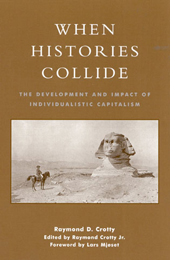 |
When Histories Collide:
The Development and Impact of Individualistic Capitalism
by Raymond Crotty (1925-1994)
AltaMira Press 2001
"Edited by his son Raymond, and published posthumously in 2001. It is an economic history of mankind from the earliest stages of human development to the present day." Source: Wikipedia
Reviewed on behalf of the American Sociological Association, by Professor Michael Mann,
University of California, Los Angeles:
"This is an extraordinary book by an extraordinary man...Once in a blue moon, backgrounds like this enable someone to write a book that we professors, weighed down by disciplines and schools of thought, could never write...this book is an original...a must-read...Crotty uses his distinctive brand of biological and economic materialism to very powerful effect...all social scientists and historians with broad comparative interests, especially in the economy, demography, and human health of the South of the world, should read this book and reflect long on it.
- Professor Michael Mann, UCLA, Contemporary Sociology, Vol. 33, No. 2, pp. 190-192
MORE reviews HERE |
Back to top
Download
FREE eBook
or purchase
hardcopy edition HERE.
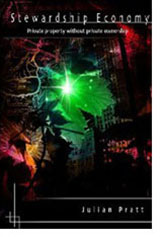 |
Stewardship Economy
Private property without private ownership
by Julian Pratt
LuLu Press (2010)
Stewardship Economy is part of a much wider movement for EarthSharing.org, whose members believe in a world where:
- Everyone has enough to eat
- Everyone enjoys a clean and safe environment
- Everyone shares in the economic value of the Earth's natural resources
The author, Julian Pratt stated:
I have written Stewardship Economy: private property without private ownership for the broadsheet reader who is looking for a new lens through which to view the major economic issues of our time poverty, inequalities, the environment, globalisation, the tax-benefit system, pensions, house prices, negative equity, banking, recession, unemployment, sovereign debt.The lens I offer is the property system that we apply to the natural world. >>> more reviews here: |
Back to top
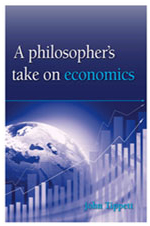 |
A Philosophers Take on Economics
by Dr. John Tippett
Delphian Books (2012)
Science explains and understands the world of matter, philosophy explains and understands the world of spirit. Economics is the meeting place of these two worlds. Whilst the immediate concern of economics is policy in the “world of matter”, the key participant in economic life is the human being, whose ultimate purpose of participation is to do with the “world of spirit”. Hence economics meets these two realms, stands at their interface. Its task is to ensure the rule of justice.
This book is aimed at presenting a common-sense, first-principles, philosophical perspective on a vital subject that seems to have lost its way. There is such a thing as justice, there is such a thing as truth; and these two need not be lost forever.
Review by Bryan Kavanagh: How satisfying to read a book which explains simply, logically and coherently why economies are currently failing: economic justice no longer exists. Civil freedom may have been granted to us, but we are denied economic freedom by distributional systems which pay obeisance to greed. >>> more
|
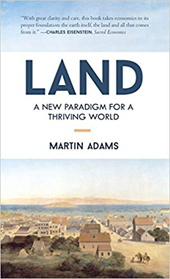
"... ways humanity might create a brighter and healthier place for us all to live."
|
Land: A New Paradigm for a Thriving World
by Martin Adams
North Atlantic Books 2015
Summary
Many of us already sense that our current economic system creates inequality and also engenders the ecological destruction of our planet. What we don’t seem to understand is why: For example, why does it lead to financial insecurity for many, even for those who, by all accounts, shouldn’t have to worry about money? And why exactly are we destroying our planet in our frantic conversion of nature into digits and little bits of paper we call money?
One of the main reasons our current economic system doesn’t work for everyone is because the revenue flow from the commons—which include all gifts of nature—has been privatized. For example, when an oil company makes money, it not only charges money for its effort and for the machinery it uses to extract oil from the ground, it also makes money from the value of the oil itself. The same can be said of the money that people make through their private ownership of land—and what banks make through their financing of private landownership via the mortgage. This privatization of the revenue flow from nature is one of the root causes of economic recessions, ecological destruction, as well as social and cultural decline.
All of nature is community wealth, including—and especially—land. >>> more
Read the blog to learn more. |
|
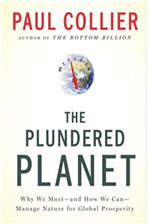
|
There are two forms of plunder. One is where assets, which should belong to the many, are expropriated by the few. The other is where the present generation expropriates what should be benefiting the future.
The Plundered Planet
Why We Must – and How We Can –
Manage Nature for Global Prosperity
Sir. Paul Collier
Oxford University Press (2010)
Paul Collier is Professor of Economics at Oxford University and Director of the Centre for the Study of African Economies. His book The Plundered Planet, published by Oxford University Press, forms the basis of the lecture delivered at University of Melbourne on 26 November 2010. See lecture notes here
See Melbourne University lecture transcript, here
The subject of The Plundered Planet is the management and mismanagement of natural assets. The broad argument is that natural assets do not have any natural owners – they are just ‘there’. And that makes them vulnerable to ‘plunder’ in one form or another. One form of plunder is where assets which should belong to the many are expropriated by the few. This form has been very common in Africa. The other form – very much the concern of environmentalists – is where the present generation expropriates what should be benefiting the future.
The holes in the governance of natural assets
Governance of natural assets is central to avoiding both forms of plunder. The biggest problems of the mismanagement of nature will occur where governance is weak. The two great holes where mismanagement of natural assets is greatest are in countries that are very weakly governed – fragile or failed states. ...
The Plundered Planet represents a paradigm-changing intervention and should be essential reading for anyone concerned about our future on this planet.
===
In 2014, Sir Paul Collier received a knighthood for services to promoting research and policy change in Africa.
Back to top
|
|

|

|
|

